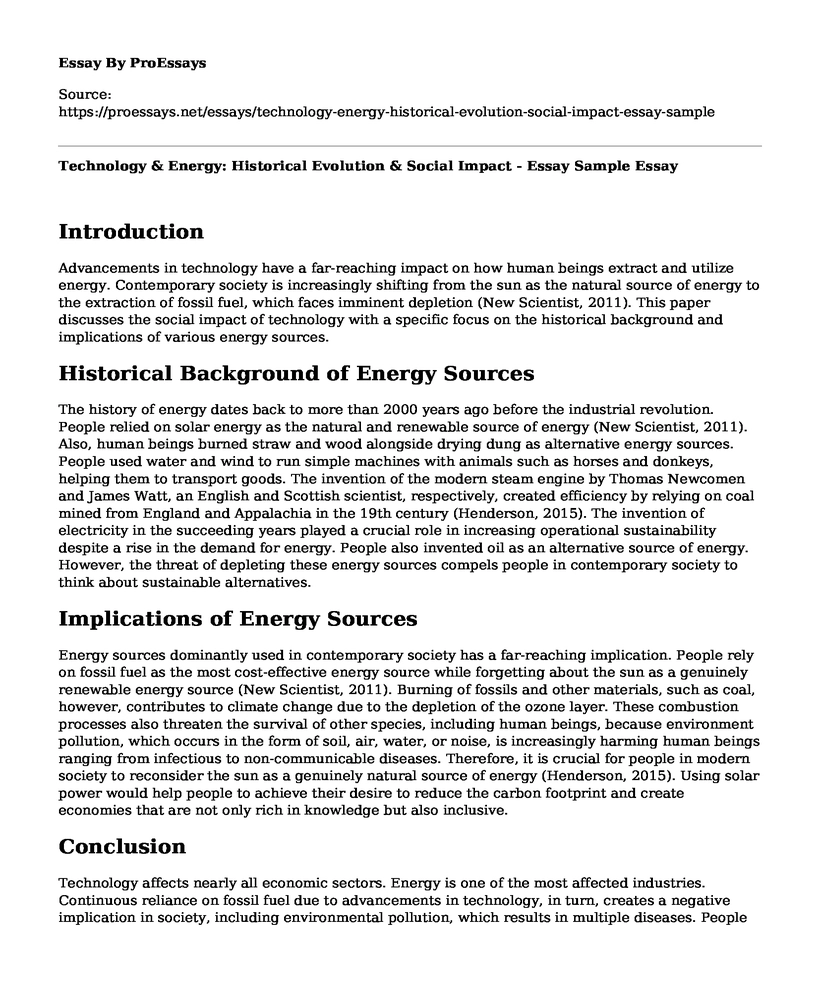Introduction
Advancements in technology have a far-reaching impact on how human beings extract and utilize energy. Contemporary society is increasingly shifting from the sun as the natural source of energy to the extraction of fossil fuel, which faces imminent depletion (New Scientist, 2011). This paper discusses the social impact of technology with a specific focus on the historical background and implications of various energy sources.
Historical Background of Energy Sources
The history of energy dates back to more than 2000 years ago before the industrial revolution. People relied on solar energy as the natural and renewable source of energy (New Scientist, 2011). Also, human beings burned straw and wood alongside drying dung as alternative energy sources. People used water and wind to run simple machines with animals such as horses and donkeys, helping them to transport goods. The invention of the modern steam engine by Thomas Newcomen and James Watt, an English and Scottish scientist, respectively, created efficiency by relying on coal mined from England and Appalachia in the 19th century (Henderson, 2015). The invention of electricity in the succeeding years played a crucial role in increasing operational sustainability despite a rise in the demand for energy. People also invented oil as an alternative source of energy. However, the threat of depleting these energy sources compels people in contemporary society to think about sustainable alternatives.
Implications of Energy Sources
Energy sources dominantly used in contemporary society has a far-reaching implication. People rely on fossil fuel as the most cost-effective energy source while forgetting about the sun as a genuinely renewable energy source (New Scientist, 2011). Burning of fossils and other materials, such as coal, however, contributes to climate change due to the depletion of the ozone layer. These combustion processes also threaten the survival of other species, including human beings, because environment pollution, which occurs in the form of soil, air, water, or noise, is increasingly harming human beings ranging from infectious to non-communicable diseases. Therefore, it is crucial for people in modern society to reconsider the sun as a genuinely natural source of energy (Henderson, 2015). Using solar power would help people to achieve their desire to reduce the carbon footprint and create economies that are not only rich in knowledge but also inclusive.
Conclusion
Technology affects nearly all economic sectors. Energy is one of the most affected industries. Continuous reliance on fossil fuel due to advancements in technology, in turn, creates a negative implication in society, including environmental pollution, which results in multiple diseases. People should, therefore, reconsider using solar energy, as the most natural, efficient, readily available, and cost-effective option, as discussed in this paper.
References
Henderson, H. (2015). The Politics of the Solar Age: 1975-2015. Cadmus: Promoting Leadership Thought that Leads to Action, 2(5), 101-111. Retrieved from http://cadmusjournal.org/files/pdfreprints/vol2issue5/cadmus-v2-i5-politics-solar-age-hhenderson-reprint.pdf.
New Scientist (2011 March). The sun is our only truly renewable energy source. [Online]. Retrieved from https://www.newscientist.com/article/mg21028062-500-the-sun-is-our-only-truly-renewable-energy-source/.
Cite this page
Technology & Energy: Historical Evolution & Social Impact - Essay Sample. (2023, Mar 21). Retrieved from https://proessays.net/essays/technology-energy-historical-evolution-social-impact-essay-sample
If you are the original author of this essay and no longer wish to have it published on the ProEssays website, please click below to request its removal:
- Should Children Carry Cell Phones To School? - Essay Sample
- Virtual Identity Essay Example
- Paper Example on AI: Unlocking the Potential of Human-Level Performance
- Expert Systems: AI Technologies for Human/Organizational Behaviors - Essay Sample
- UK Passive Design Choices: Achieving Sustainability With Low Energy Use - Essay Sample
- Paper Example on Self-Driving Automobiles: An Innovative Revolution
- Impacts of Emerging Technologies - Report Sample







